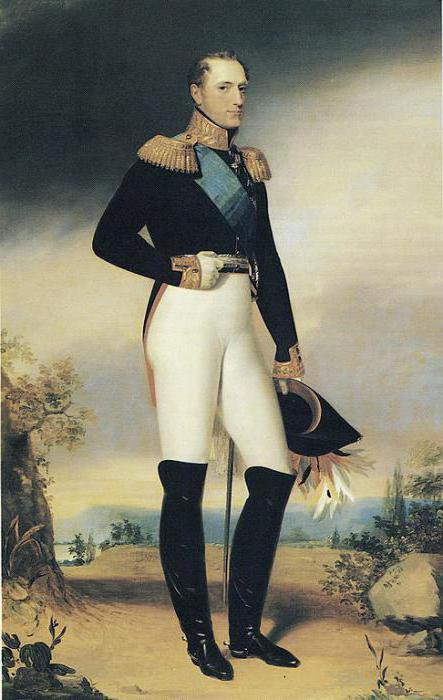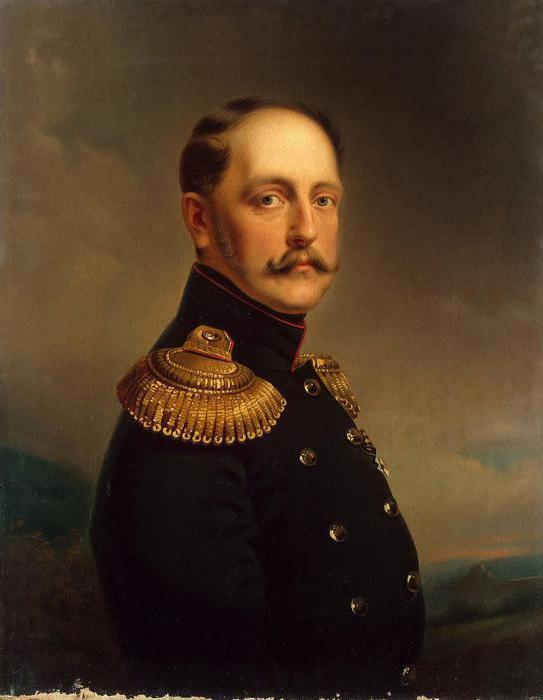The personality of Emperor Nicholas I is very controversial. Thirty years of rule is a series of paradoxical phenomena:
- unprecedented flowering of culture and manic censorship;
- total political control and prosperity of corruption;
- the rise of industrial production and economic backwardness from European countries;
- control of the army and its powerlessness.
Statements of contemporaries and real historical facts also cause a lot of controversy, so it is difficult to objectively assess the personality of Nicholas 1.
The childhood of Nicholas I
Nikolai Pavlovich was born on June 25, 1796 and became the third son of the imperial couple of the Romanovs. Very little Nicholas was brought up by Baroness Charlotte Karlovna von Lieven, to whom he became very attached and adopted from her some character traits, such as strength of character, stamina, heroism, openness. Then his craving for military affairs was already manifested. Nikolai loved to watch military parades, divorces, play military toys. And already at the age of three he put on his first military uniform of the Life Guards of the Horse Regiment.
The little prince suffered the very first shock at the age of four, when his father, Emperor Pavel Petrovich, died. Since then, the responsibility of educating the heirs fell on the shoulders of the widow of Maria Fedorovna.
Mentor Nikolai Pavlovich
From 1801 and over the next seventeen years, Lieutenant General Matvey Ivanovich Lamsdorf, the former director of the gentry (first) cadet corps under Emperor Paul, was appointed Nikolai’s mentor. Lamsdorf did not have the slightest idea about the ways of educating royal persons - future rulers - and about any educational activity in general. His appointment was justified by the desire of Empress Maria Fyodorovna to protect her sons from passion for military affairs, and this was the main goal of Lamsdorf. But instead of interest the princes in other activities, he went against all their wishes. For example, accompanying the young princes on their trip to France in 1814, where they were eager to take part in hostilities against Napoleon, Lamsdorf deliberately drove them very slowly, and the princes arrived in Paris when the battle was already over. Due to the wrong tactics, the educational activities of Lamsdorf did not reach the goal. When Nicholas I married, Lamsdorf was relieved of his duties as a mentor.

Hobbies
The Grand Duke earnestly and passionately studied all the wisdom of military science. In 1812, he was eager for war with Napoleon, but his mother did not let him in. In addition, the future emperor was fond of engineering, fortification, architecture. But Nikolai did not like humanitarian disciplines and was negligent in their study. Subsequently, he regretted it very much and even tried to fill in the gaps in his studies. But he never managed to do this.
Nikolai Pavlovich was fond of painting, played the flute, loved opera and ballet. He had a good artistic taste.
The future emperor had a beautiful appearance. The growth of Nicholas 1 - 205 cm, lean, broad-shouldered. The face is slightly elongated, the eyes are blue, always a stern look. Nikolai had excellent physical fitness and good health.
Marriage
The elder brother Alexander I in 1813, having visited Silesia, chose Nicholas bride - the daughter of King of Prussia Charlotte. This marriage was supposed to strengthen Russian-Prussian relations in the fight against Napoleon, but unexpectedly for all the young people sincerely fell in love. July 1, 1817 they were married. Charlotte of Prussia in Orthodoxy became Alexandra Fedorovna. The marriage was happy and having many children. The Empress gave birth to Nikolai seven children.
After the wedding, Nicholas 1, a biography and interesting facts about which are presented to your attention in the article, began to command the guard division, and also took up the duties of inspector general for engineering.
Carrying out what he loved, the Grand Duke was very responsible for his duties. He opened company engineering and battalion schools with engineering troops. In 1819, the Main Engineering School was founded (now the Nikolaev Engineering Academy). Thanks to the excellent facial memory that allows even ordinary soldiers to be remembered, Nikolai gained respect in the army.
The death of Alexander 1
In 1820, Alexander announced to Nicholas and his wife that Konstantin Pavlovich, the next heir to the throne, intended to renounce his right due to childlessness, divorce and second marriage, and Nikolay should become the next emperor. In this regard, Alexander signed a manifesto confirming the abdication of Konstantin Pavlovich and the appointment of Nikolai Pavlovich as heir to the throne. Alexander, as if sensing his near demise, bequeathed to read the document immediately after his death. November 19, 1825, Alexander I passed away. Nicholas, despite the manifesto, the first swore allegiance to Prince Konstantin. It was a very noble and honest act. After a period of uncertainty, when Konstantin did not officially abdicate, but also refused to take the oath. The growth of Nicholas 1 was rapid. He decided to become the next emperor.
The bloody beginning of reign
December 14, the day of the oath of Nicholas I, an uprising was organized (called the Decembrist uprising), aimed at overthrowing the autocracy. The uprising was crushed, the surviving participants were sent into exile, five were executed. The emperor’s first impulse was to pardon everyone, but the fear of a palace coup forced him to organize a court in all the strictness of the law. Nevertheless, Nikolai acted generously with those who wanted to kill him and his entire family. There are even confirmed facts that the wives of the Decembrists received monetary compensation, and children born in Siberia could study in the best educational institutions at the expense of the state.
This event influenced the course of the further reign of Nicholas 1. All his activities were aimed at preserving the autocracy.
Domestic policy
The reign of Nicholas 1 began when he was 29 years old. Accuracy and exactingness, responsibility, struggle for justice in combination with high efficiency were the emperor’s bright qualities. The years of army life influenced his character. He led a rather ascetic life: he slept on a hard bed, hiding in his greatcoat, kept moderation in food, did not drink alcohol and did not smoke. Nikolai worked 18 hours a day. He was very demanding in the first place to himself. The preservation of the autocracy was considered his duty, and all his political activities served this purpose.
Under Nicholas 1, Russia underwent the following changes:
- The centralization of power and the creation of a bureaucratic apparatus of government. The emperor only wanted order, control and accountability, but in essence it turned out that the number of bureaucratic posts increased at times and with them the number and size of bribes increased. Nikolai himself understood this and told his eldest son that only two of them did not steal in Russia.
- The solution of the issue of serfs. Thanks to a series of reforms, the number of serfs has significantly decreased (from 58% to 35% over about 45 years), they have rights whose protection was controlled by the state. The complete abolition of serfdom did not happen, but the reform served as a starting point in this matter. Also at this time, the education system for peasants began to take shape.
- The emperor paid special attention to order in the army. Contemporaries criticized him for too close attention to the troops, while the morale of the army was of little interest to him. Frequent checks, reviews, punishments for the slightest inaccuracy distracted soldiers from their main tasks, and made them weak. But was it really so? During the reign of Emperor Nicholas 1, Russia fought with Persia and Turkey in 1826-1829, and in Crimea in 1853-1856. In the wars with Persia and Turkey, Russia won. The Crimean war led to the loss of Russian influence in the Balkans. But historians call the cause of the Russian defeat the economic backwardness of Russia compared to the enemy, including the existence of serfdom. But a comparison of human losses in the Crimean War with other similar wars shows that they are less. This proves that the army under the leadership of Nicholas I was powerful and highly organized.

Economic development
Emperor Nicholas 1 inherited Russia, deprived of industry. All production items were imported. By the end of the reign of Nicholas 1, economic growth was noticeable. Many types of production necessary for the country already existed in Russia. Under his leadership, the construction of paved roads and railways began. In connection with the development of railway transport, the machine-building industry began to develop, including the car-building industry. An interesting fact is that Nicholas I decided to build railways wider (1524 mm) than in European countries (1435 mm), so that in case of war it would complicate the enemy’s movement around the country. And it was very wise. It was this trick that prevented the Germans in 1941 from supplying full ammunition when attacking Moscow.
In connection with growing industrialization, intensive urban growth began. During the reign of Emperor Nicholas I, the urban population more than doubled. Thanks to engineering education received in his youth, Nikolai 1 Romanov monitored the construction of all major facilities in St. Petersburg. His idea was not to exceed the height of the eaves of the Winter Palace for all the structures of the city. As a result, St. Petersburg has become one of the most beautiful cities in the world.
Under Nicholas 1, growth in the educational sphere was also noticeable. Many educational institutions were opened. Among them are the famous Kiev University and St. Petersburg Technological Institute, military and naval academies, a number of schools, etc.
The heyday of culture
The 19th century became a real flowering of literary creation. Pushkin and Lermontov, Tyutchev, Ostrovsky, Turgenev, Derzhavin and other writers and poets of this era were incredibly talented. At the same time, Nikolai 1 Romanov imposed severe censorship, reaching the point of absurdity. Therefore, literary geniuses periodically experienced persecution.
Foreign policy
Foreign policy during the reign of Nicholas I included two main areas:
- Return to the principles of the Holy Alliance, suppression of revolutions and any revolutionary ideas in Europe.
- Strengthening influence in the Balkans for free navigation in the Dardanelles and Bosporus.
These factors caused the Russo-Turkish, Russo-Persian and Crimean wars. The defeat in the Crimean War led to the loss of all previously won positions in the Black Sea and the Balkans and provoked an industrial crisis in Russia.
Death of the emperor
As the story tells, Nicholas 1 died on March 2, 1855 (58 years old) from pneumonia. He was buried in the cathedral of the Peter and Paul Fortress.
And finally ...
The reign of Nicholas I, of course, left a tangible mark, both in the economy and in the cultural life of Russia, however, did not lead to any epoch-making changes in the country. The following factors forced the emperor to slow down progress and follow the conservative principles of autocracy:
- moral unwillingness to rule the country;
- lack of education;
- fear of overthrow due to the events of December 14;
- feeling of loneliness (conspiracy against Father Paul, brother Alexander, abdication of brother Constantine).
Therefore, none of the subjects regretted the death of the emperor. Contemporaries more often condemned the personal characteristics of Nicholas 1, he was criticized as a politician and as a person, but historical facts speak of the emperor as a noble man who is fully dedicated to serving Russia.